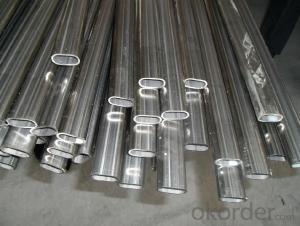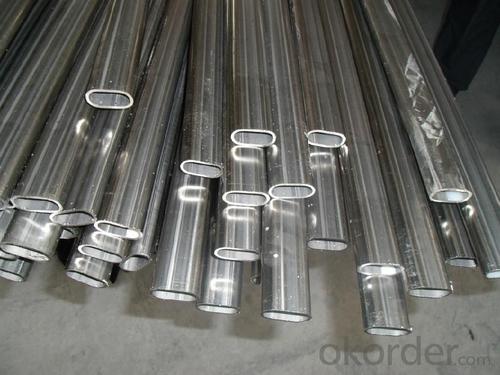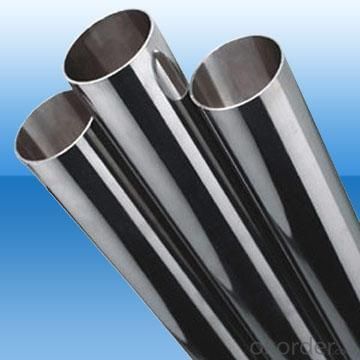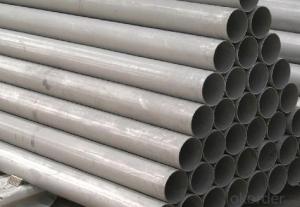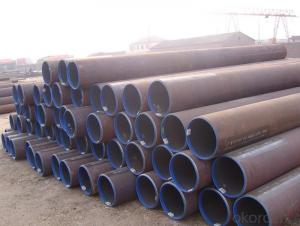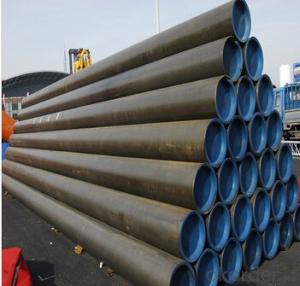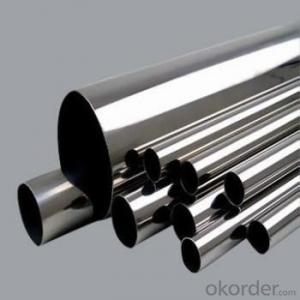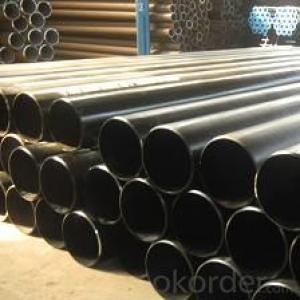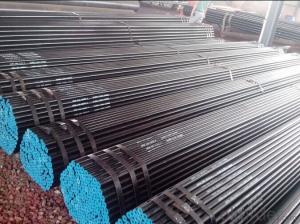Non-alloy Varnished Coated Seamless Carbon Steel Pipe For Oil&Gas Use
- Loading Port:
- Tianjin
- Payment Terms:
- TT OR LC
- Min Order Qty:
- 35 m.t.
- Supply Capability:
- 5000 m.t./month
OKorder Service Pledge
OKorder Financial Service
You Might Also Like
Specification
Structure :
Seamless pipe is formed by drawing a solid billet over a piercing rod to create the hollow shell. As the manufacturing process does not include any welding, seamless pipes are perceived to be stronger and more reliable. Historically seamless pipe was regarded as withstanding pressure better than other types, and was often more easily available than welded pipe.
Main Features :
• High manufacturing accuracy
• High strength
• Small inertia resistance
• Strong heat dissipation ability
• Good visual effect
• Reasonable price
Specification:
1) Material:20#(ASTM A 106/A53 GRB.API5LGRB,GB),45#,16Mn,10#.
2) Specification range:OD:21.3-610mm,WT:6-70mm,length:6-12m or according to the requirement of clients.
3) Excutive standards:GB,ASME API5L.ASTM A 106/A53,Despite of the above standards,we can also supply seamless steel pipe with standard of DIN,JIS,and so on,and also develop new products according to the requirements of our clients!
4) Surface:black lacquered,varnish coating or galvanized.
5) Ends:Beveled or square cut,plastic capped,painted.
6) Packing:bundles wrapped with strong steel strip,seaworthy packing.
FAQ :
A. How is the quality of your products?
Our products are manufactured strictly according to national and internaional standard, and we take a test on every pipe before delivered out. If you want see our quality certifications and all kinds of testing report, please just ask us for it.
Guaranteed: If products’ quality don’t accord to discription as we give or the promise before you place order, we promise 100% refund.
B. How about price?
Yes, we are factory and be able to give you lowest price below market one, and we have a policy that “ for saving time and absolutely honest business attitude, we quote as lowest as possible for any customer, and discount can be given according to quantity”,if you like bargain and factory price is not low enough as you think, just don’t waste your time.Please trust the quotation we would give you, it is professional one.
C.Why should you chose us?
Chose happens because of quality, then price, We can give you both.Additionally, we can also offer professional products inquiry, products knowledge train(for agents), smooth goods delivery, exellent customer solution proposals.Our service formula: good quality+good price+good service=customer’s trust
SGS test is available, customer inspection before shipping is welcome, third party inspection is no problem.
Any question, pls feel free to contact us !
Product image:
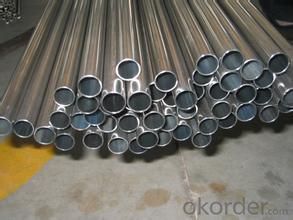
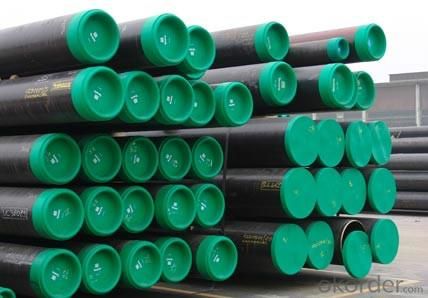
Company Information:
CNBM International Corporation (CNBM International) is the most important trading platform of CNBM Group Corporation, a state-owned company under the direct supervision of State-owned Assets Supervision and Administration Commission of the State Council.
In line with the business, CNBM International launched E-business platform Okorder.com.Our goal is to transform CNBM International into the global leading brand in building materials industry within 3 to 5 years through innovation and reform, by strengthening the overall management of supply chain, developing and cultivating both domestic and overseas market, improving the procedure and information system, enhancing the ability to organize resources and to provide value-added services under a professional team and a learning organization.
- Q: What is the dimensional stability of steel pipes?
- The dimensional stability of steel pipes refers to their ability to maintain their shape and size under different conditions and over time. Steel pipes are known for their excellent dimensional stability, as they are highly resistant to deformation, warping, and expansion or contraction caused by temperature variations or external forces. This stability is attributed to the inherent strength and rigidity of steel, making it a reliable choice for various applications where maintaining precise dimensions is crucial.
- Q: How are steel pipes used in the manufacturing of power plants?
- Steel pipes are extensively used in the manufacturing of power plants for various applications such as transporting water, steam, and other fluids, as well as for structural purposes. They are commonly used for the construction of boiler tubes, heat exchangers, condensers, and steam distribution systems. Additionally, steel pipes are essential for conveying fuel gases and air in power plants, ensuring efficient operation and safety.
- Q: What are the different types of joints used with steel pipes?
- Steel pipes commonly use several types of joints, depending on the specific application and requirements. Some of the most frequently used types are as follows: 1. Butt Joint: This type of joint is the most basic, involving the alignment and welding of two pipes at their ends. It creates a strong and continuous connection, but reinforcement may be necessary depending on the pipe's size and pressure rating. 2. Socket Weld Joint: Smaller diameter pipes often utilize this joint, where one pipe is inserted into the socket of another and then welded together. It provides good strength and resistance against leaks. 3. Threaded Joint: A threaded joint involves screwing together two pipes with threaded ends. It is commonly used in low-pressure applications and necessitates the use of pipe threads and sealants for a tight and leak-free connection. 4. Flanged Joint: In high-pressure applications, a flanged joint connects two pipes by bolting together flanges at their ends. This type of joint allows for easy disconnection and maintenance. 5. Grooved Joint: A grooved coupling is placed around the ends of two pipes in a grooved joint, which is then secured with bolts. This joint is commonly used in fire protection systems due to its quick installation and easy maintenance. 6. Welded Joint: A welded joint involves fusing two pipes together using various welding techniques like GTAW or GMAW. It provides a strong and permanent connection but requires skilled labor and additional equipment. Each type of joint has its own advantages and limitations, and the selection depends on factors such as pipe size, pressure rating, application, and installation requirements. Choosing the appropriate joint is crucial to ensure the integrity and reliability of the steel pipe system.
- Q: How are steel pipes tested for quality control?
- Steel pipes are tested for quality control through various methods such as visual inspection, non-destructive testing, and physical testing. Visual inspection involves checking the pipes for any visible defects or inconsistencies in their appearance. Non-destructive testing methods like ultrasonic testing, magnetic particle testing, and radiographic testing are used to detect internal flaws or defects without damaging the pipes. Additionally, physical tests like tensile and impact testing are performed to evaluate the mechanical properties of the pipes. These comprehensive testing techniques ensure that steel pipes meet the required quality standards before they are used in various applications.
- Q: What's the gate number of the precision steel pipe?
- Precision steel pipe refers to the high precision steel pipe, the wall thickness and internal and external diameter can be controlled within 10 wire tolerance range
- Q: How are steel pipes used in the textile industry?
- Steel pipes are commonly used in the textile industry for various applications such as conveying fluids, gases, and chemicals within the manufacturing process. They are used to transport hot water, steam, and air for heating and drying purposes, as well as to supply and distribute water and chemicals for dyeing and printing. Additionally, steel pipes are also utilized in the construction of textile machinery and equipment, providing support and structural integrity to the production line. Overall, steel pipes play a crucial role in ensuring the efficient and reliable operation of textile manufacturing processes.
- Q: What are the advantages of using steel pipes in plumbing systems?
- There are several advantages of using steel pipes in plumbing systems. Firstly, steel pipes are highly durable and have a long lifespan, making them a reliable choice for plumbing installations. They are resistant to corrosion, rust, and other forms of damage, ensuring the integrity of the plumbing system over time. Additionally, steel pipes have a high tensile strength, allowing them to withstand high pressure and heavy loads without deformation or leakage. They also have excellent heat resistance, making them suitable for hot water and steam applications. Lastly, steel pipes offer a smooth inner surface, minimizing friction and maintaining a consistent flow rate, which is crucial for efficient water distribution and drainage in plumbing systems.
- Q: How long do steel pipes last?
- The lifespan of steel pipes can vary depending on several factors, including the quality of the steel used, the environment in which they are installed, and the maintenance and care given to them. Generally, steel pipes are known for their durability and longevity. With proper installation and regular maintenance, steel pipes can last for several decades, often exceeding 50 years. However, it is important to note that external factors such as corrosion, exposure to extreme temperatures, and chemical reactions can significantly affect their lifespan. Regular inspections, timely repairs, and protective coatings can help extend the life of steel pipes, ensuring their reliability and functionality for many years.
- Q: What is the cost of steel pipes compared to other piping materials?
- The cost of steel pipes compared to other piping materials can vary depending on factors such as the size, grade, and specifications of the pipes, as well as market conditions and location. In general, steel pipes tend to be more expensive than some alternative piping materials such as PVC (polyvinyl chloride) or HDPE (high-density polyethylene). However, when compared to other materials like copper or stainless steel, steel pipes can often be more cost-effective. Steel pipes are known for their durability, strength, and resistance to high pressures and temperatures, making them suitable for various applications such as oil and gas pipelines, plumbing systems, and structural supports. Their longevity and reliability can offset the initial higher cost, as they often require less maintenance and have a longer lifespan than other materials. Additionally, steel pipes are readily available in different sizes and grades, making them versatile and adaptable to different project requirements. This availability and versatility can contribute to their cost-effectiveness, as they can be easily sourced and customized to specific needs. It's important to note that prices for steel pipes can fluctuate due to market conditions and factors such as raw material costs, transportation expenses, and labor charges. Therefore, it is advisable to consult with suppliers or industry experts to get accurate pricing information for steel pipes based on specific project specifications and market conditions.
- Q: What does carbon seamless steel pipe mean? What is the difference between a seamless 20# and an ordinary one? What is it used in detail?
- Carbon steel is relatively alloy steel. Its carbon content is higher than alloy steel, and 20# steel is one kind of carbon steel.
Send your message to us
Non-alloy Varnished Coated Seamless Carbon Steel Pipe For Oil&Gas Use
- Loading Port:
- Tianjin
- Payment Terms:
- TT OR LC
- Min Order Qty:
- 35 m.t.
- Supply Capability:
- 5000 m.t./month
OKorder Service Pledge
OKorder Financial Service
Similar products
Hot products
Hot Searches
Related keywords
